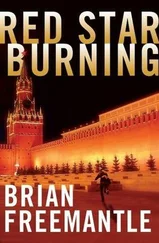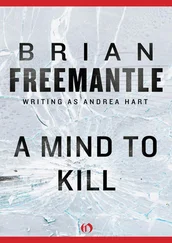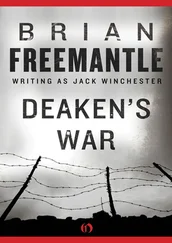Brian Freemantle - Betrayals
Здесь есть возможность читать онлайн «Brian Freemantle - Betrayals» весь текст электронной книги совершенно бесплатно (целиком полную версию без сокращений). В некоторых случаях можно слушать аудио, скачать через торрент в формате fb2 и присутствует краткое содержание. Жанр: Триллер, на английском языке. Описание произведения, (предисловие) а так же отзывы посетителей доступны на портале библиотеки ЛибКат.
- Название:Betrayals
- Автор:
- Жанр:
- Год:неизвестен
- ISBN:нет данных
- Рейтинг книги:5 / 5. Голосов: 1
-
Избранное:Добавить в избранное
- Отзывы:
-
Ваша оценка:
- 100
- 1
- 2
- 3
- 4
- 5
Betrayals: краткое содержание, описание и аннотация
Предлагаем к чтению аннотацию, описание, краткое содержание или предисловие (зависит от того, что написал сам автор книги «Betrayals»). Если вы не нашли необходимую информацию о книге — напишите в комментариях, мы постараемся отыскать её.
Betrayals — читать онлайн бесплатно полную книгу (весь текст) целиком
Ниже представлен текст книги, разбитый по страницам. Система сохранения места последней прочитанной страницы, позволяет с удобством читать онлайн бесплатно книгу «Betrayals», без необходимости каждый раз заново искать на чём Вы остановились. Поставьте закладку, и сможете в любой момент перейти на страницу, на которой закончили чтение.
Интервал:
Закладка:
Willsher sighed, looking down at his pristine blotter. He said: “There are going to be more media approaches.”
Every conversation reverted to their sensitivity about publicity, Janet recognized. She said: “I understand what you’re saying: I really do. To refuse to talk would be as wrong as saying too much. How about if I said there had been a meeting with an official of the Agency who assured me that everything possible was being done?”
Willsher smiled, suddenly, an unexpected expression. He said: “I think that sounds fine.”
“In return for which I get a number where I can reach you whenever I want,” insisted Janet.
The smile died. Willsher said: “You have my word I will call as soon as there is news.”
“I want a number, damn it!”
Willsher blinked at the outburst. He said: “For you only.”
“I told you I understand!”
There was the briefest of hesitations and the man scrawled out a number on a scratch pad and offered it to her across the table. Janet took it and saw at once, relieved, that it was prefixed by the 703 Langley area code. Willsher said: “We’re going to stay on top with this one. You must believe me on that.”
“I’ll try,” said Janet.
She rigidly maintained her side of the bargain, confining herself to what they had agreed when the renewed newspaper and television inquiries came, until after three days the only regular callers were news agencies. The Washington Post tried to keep the story alive by publishing in their Sunday “Style” section more of the letters between herself and Sheridan that she had made available that first day, and Janet spent an uncomfortable twenty-four hours until Monday, when she could reach Willsher to explain. The CIA man said he understood and that there the feature hadn’t caused any problems.
In the first few days Janet rang Willsher morning and night. Never once did he react impatiently. By the end of the second week Janet herself recognized the pointlessness and reduced her calls to one a day.
For his part, Willsher kept the terms on behalf of the Agency, as well, reaching her, at the beginning of the third week before any news outlet to tell her of the photographs released by the Islamic Jihad. Harriet hurried over, in response to Janet’s call, and together they sat, hands linked, in front of the television.
Janet whimpered aloud when the picture flashed up, shocked by Sheridan’s appearance. There was no identifiable background and she guessed it had been taken against the wall of the cell in which he was being held. He had not been allowed to shave and the beard growth was very white, making him look much older. His hair was unkempt and straggled in places almost to his collar and it was grayer than she remembered, too, adding to the impression of age. The sports shirt was open at the neck and his thinness, almost a frailty, was more obvious to her from the bony ridges around his neck and chest than the hollow, sunken cheeks. Sheridan’s eyes were sunken, as well. Janet thought how similar he appeared around the eyes to how she had looked that day of the intended bathroom suicide.
Beside her Harriet said: “Jesus!” and then at once, embarrassed at the unthinking reaction, tried to correct it by saying “I’m sorry… I didn’t mean that…” and finally, “Oh shit!”
The commentary said the photograph had been accompanied by demands for the release of ten members of the group with whom the kidnappers were linked and who were currently being held in custody in Kuwait. If the Kuwaiti prisoners were not released, the American would be executed. The still photograph of Sheridan faded, to be replaced by live footage of a State Department spokesman in front of a map of the world, saying that the demands were being considered and discussed with friendly countries. Janet took the first two calls herself but after that relayed her reaction through Harriet, saying that she was relieved at the evidence that Sheridan was still alive and that she hoped negotiations could now be opened leading to his freedom. So busy was her telephone that it was difficult to get a call out but she finally did. Willsher seemed to be expecting her.
“Kuwait normally refuses to be pressured,” Janet said at once.
“Yes,” agreed the CIA official, just as quickly.
“Will they on this occasion?”
“The liaison is through the State Department,” Willsher said vaguely.
“Is Kuwait being asked to concede?”
“It’s delicate,” Willsher said. “There’s a limit to the requests and demands we can make.”
Janet paused, needing to force herself to ask the question. “So John is going to die?”
“No, Ms. Stone,” said the man, always patient. “Everything that can be done is being done: I keep telling you that. And you’ve overlooked something in their demand.”
“What!” asked Janet.
“They haven’t imposed a time limit for compliance.”
Janet was annoyed at herself for not having spotted the fact, which was important. Probing to see if the official view were the same as her own, Janet said: “How do you see the significance of that?”
“A concession, before we even start,” said Willsher, encouragingly. “They know a time limit would have boxed us in. So they’ve already accepted that persuasion can take a while. We’ve got room to move.”
“Yes,” agreed Janet, feeling a sweep of hope.
“So let’s not get too depressed too quickly,” Willsher said encouragingly.
“I’ll try not to let it happen,” Janet said.
It was not an easy undertaking to keep. Two days later Kuwait officially announced that it saw no reason to abandon its established policy of resisting terrorist pressure and that they would not comply with the demand involving the American citizen, John Sheridan. The State Department immediately summoned the Kuwaiti ambassador to Foggy Bottom for talks with the Secretary of State, who was photographed bidding the diplomat farewell. On the steps of the Kuwait embassy the ambassador allowed himself to be interviewed. He said that while his country sympathized with the hostage taking of a U.S. national there had been nothing in his conversation with the Secretary of State to make him think his country would alter its stance. Concessions to terrorism encouraged further and worse acts of terrorism.
Three days after the Kuwaiti rejection, Sheridan’s kidnappers issued another photograph of him, this time apparently manacled to a metal bed or platform, with a second statement threatening to send to the U.S. embassy in Beirut severed parts of the CIA man’s body, to convince Washington and Kuwait of the seriousness of their demands.
The White House in turn issued a statement of its own deploring the threat as bestial, insisting that any such act would be treated as common criminality to be prosecuted in any country in the world and called upon civilized governments to impose their combined efforts to resolve the situation. In an unprecedented demonstration of cooperation between Mikhail Gorbachev and Ronald Reagan, Moscow published a condemnation of hostage taking and promised to liaise with Western governments to bring about its cessation.
Janet was inundated by fresh press inquiries, invitations to television appearances and offers, one as high as $10,000, to write her own account of her romance with John Sheridan and the pressure to which she felt subjected by the kidnap. A talk-show agency in Atlanta asked to represent her, suggesting a country-wide lecture tour at $5,000 an address with an assurance of a minimum of ten lectures. Senator Blackstone tried to persuade her to appear with him on a televised evangelical church service when he intended asking watching worshippers to link hands across the entire United States in a silent vigil for the safe release of John Sehridan. Janet refused them all, sticking to the agreement she had made with Willsher, although she believed that continued publicity would have maintained the U.S. public concern she regarded as necessary. She did, however, insist upon another personal meeting, and Willsher set it up at the Franklin Park office block.
Читать дальшеИнтервал:
Закладка:
Похожие книги на «Betrayals»
Представляем Вашему вниманию похожие книги на «Betrayals» списком для выбора. Мы отобрали схожую по названию и смыслу литературу в надежде предоставить читателям больше вариантов отыскать новые, интересные, ещё непрочитанные произведения.
Обсуждение, отзывы о книге «Betrayals» и просто собственные мнения читателей. Оставьте ваши комментарии, напишите, что Вы думаете о произведении, его смысле или главных героях. Укажите что конкретно понравилось, а что нет, и почему Вы так считаете.












